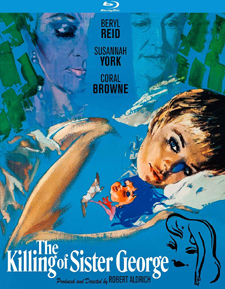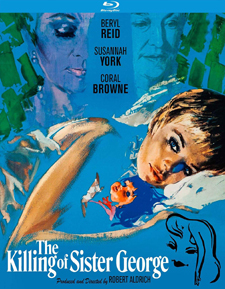Killing of Sister George, The (Blu-ray Review)

Director
Robert AldrichRelease Date(s)
1968 (November 27, 2018)Studio(s)
Cinerama Releasing Corporation (Kino Lorber Studio Classics)- Film/Program Grade: A
- Video Grade: A-
- Audio Grade: A
- Extras Grade: B
Review
Still as powerful as when originally released in 1968, The Killing of Sister George focuses on popular British soap opera star June Buckridge (Beryl Reid), who has played for many years the beloved character Sister George, a visiting nurse who looks after the medical needs and personal problems of local villagers. June is so personally invested in her role that she has her friends call her George. In her own life, June is an aging, alcoholic lesbian who lives with her much younger lover, Alice “Childie” McNaught (Susannah York), a sweet young woman who is not very bright but knows where her bread is buttered. Their relationship has elements of sado-masochism, including verbal and occasional physical abuse.
June’s world is thrown into a tailspin when she learns that her character will be killed off. Attempting to hold it together, she turns more to gin and engages in long tirades, blaming everyone around her for a decision that will leave her unemployed. Simultaneously, her relationship with Alice is reaching the breaking point.
A third woman, Mercy Croft (Coral Browne), enters the picture to complicate matters still further. An influential TV executive, the ironically named Mercy uses her position of power to manipulate the fading soap star with an upper-crust arrogance that both irritates and intimidates her. Mercy’s motives gradually become clear.
Director Robert Aldrich (The Dirty Dozen, Whatever Happened to Baby Jane?) adapted the film from the play of the same name by Frank Marcus, retaining its star from the stage production. Beryl Reid is a powerhouse as George. She’s on screen for nearly the entire film, and portrays a woman whose world is collapsing around her with often chilling intensity. Her performance makes a good film even better. Though there’s theatricality in some of her scenes, she attacks them with the ferociousness of a wild animal protecting its turf. George knows how to impale with words, hide behind a gin-induced stupor, and return kindnesses with vitriol. She’s not the kind of person you’d want as your friend, but she’s an original, and commands the screen.
Little is divulged about the backgrounds of George and Childie. We see them almost entirely in the context of their relationship. This provokes curiosity and helps to keep us riveted. When the film was originally released, the lesbian aspect was controversial, but Aldrich presents it in a matter-of-fact manner. That in itself was unusual for the period. The film has stood the test of time well.
Ms. York’s Childie contrasts dramatically with the loud, brash, invective-laced George. Calmer, less prone to outburst, and with a high tolerance for ill treatment, she puts up with George’s flaws, partially in exchange for being a “kept” woman, free of adult responsibilities.
Ms. Browne’s Mercy Croft becomes a catalyst of change for both George and Childie. Mercy has an aristocratic air and a patrician attitude and relishes the power she wields in the guise of beneficence. Mercy is the type of woman who’d stab you in the back as she sheds a tear over your demise.
The Blu-ray release is a brand new master from a 4K scan of the original camera negative. Video resolution is 1080p. Aspect ratio is 1.85:1. Visual quality is generally very good, though there is some graininess in a few scenes. A couple of vertical scratches appear, but for short duration. They are not overly distracting. Detail in close-ups is sharp, with pores on faces and details in hairdos prominent. Outdoor scenes were shot on cloudy days; there are no sunlit exteriors.
Audio is English 2.0 DTS-HD. The soundtrack is well balanced. Dialogue is clear and easy to understand. The musical score is used judiciously, allowing the dialogue to take center stage. George’s farewell party scene features nicely blended voices, ambient sound, and main dialogue.
Bonus features on the Blu-ray release include two audio commentaries, an interview with the film’s lighting/camera operator, and 7 trailers.
Audio Commentary #1 – Historian Kat Ellinger refers to Sister George as one of director Robert Aldrich’s most independent films. She notes several of the director’s best known film credits, commenting that he has never gotten his proper due as a director. He offered interesting, “subversive” roles for women that go beyond caricature. Beryl Reid plays “a woman surviving in a very difficult world.” Though the main characters are lesbians, that’s not the thrust of the story. A brief overview of Reid’s stage and television career is provided. She had been acting most of her adult life, and was known primarily as a comedienne before Sister George.
Audio Commentary #2 – Film historian David Del Valle and actor/filmmaker Michael Varrati discuss the acting techniques featured. They compare American and British soap operas, noting that Sister George has its share of “film noir moments.” The film deals with a “rollercoaster of a relationship” about control, dependence, and revenge. George “sets fires” rather than extinguishing them, worsening her situation. They comment on how the actors trusted director Aldrich, particularly in a controversial scene. Dramatic license is taken with the portrayal of the world of television in order to showcase George’s flair moments. They refer to Coral Browne’s Mercy as a monster moving in for the kill. Aldrich was asked to trim the seduction scene by the MPAA and complied.
Interview with Brian West – The film was shot in California at the Aldrich studios (interiors) and in London (exteriors). West was one of two cinematographers on the film. He was hired for the three-week shoot in England, and comments that the American cinematographer “couldn’t cope with British filming conditions.” He recalls the shoot as pleasant, despite a couple of days of rain. He didn’t think at the time that the filmmakers were breaking new ground. As a hired employee, he simply did what he was told, referring to a film set as the “perfect fascist state where one man is in charge.”
Trailers – Included are the film itself, The Grissom Gang, Ten Seconds to Hell, They Shoot Horses, Don’t They?, The Maids, and Loophole.
– Dennis Seuling

